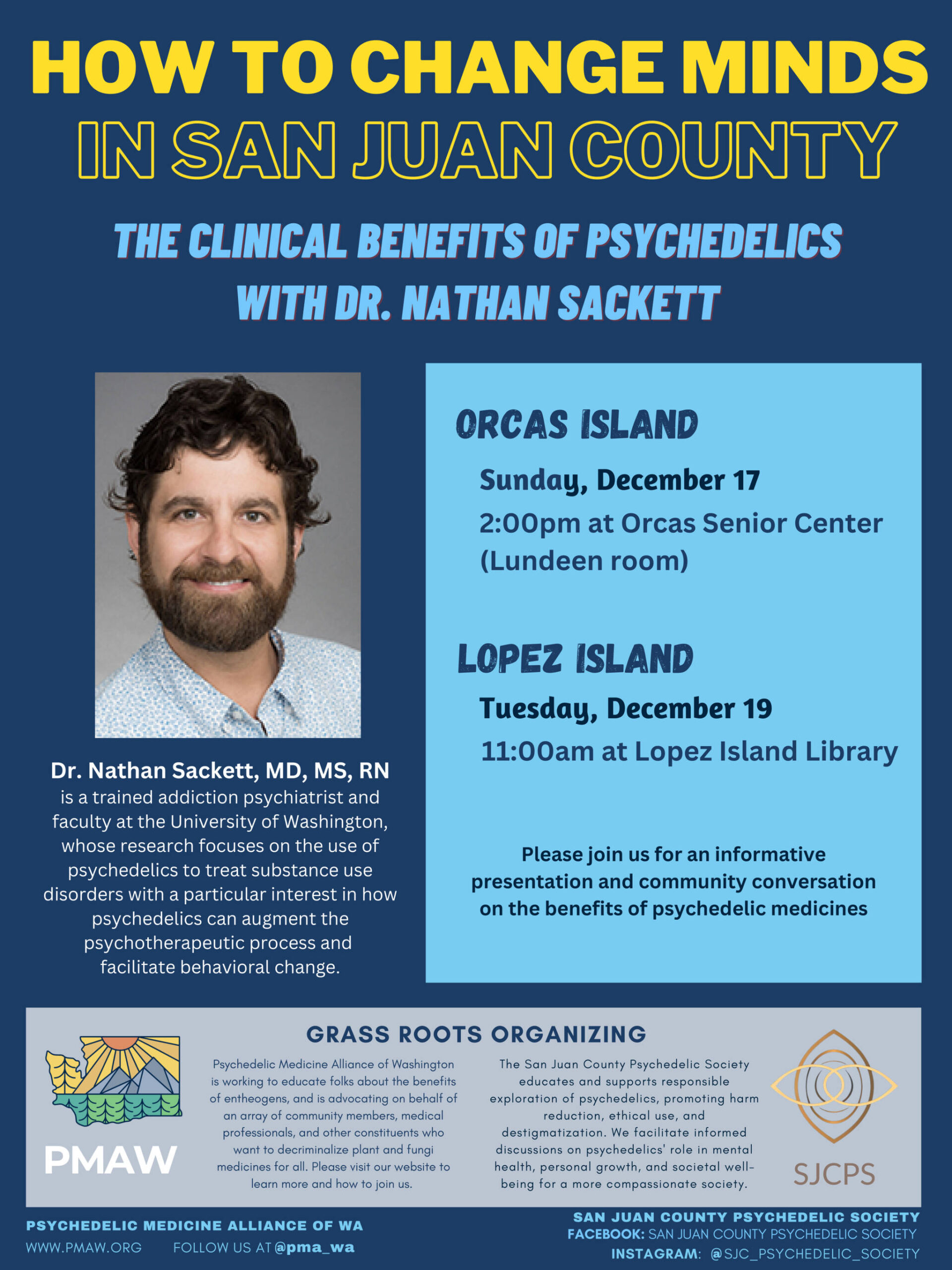The use of psychedelics has been a long-standing part of cultures around the world.
In the United States, a groundswell of support for the use of psychedelics in treating depression, anxiety and post-traumatic stress disorder has led to psilocybin (the psychedelic compound found in mushrooms) being decriminalized in Oregon and Colorado as well as many cities, including Seattle.
This past May, Washington State Governor Jay Inslee created a task force to explore the issue and authorized the University of Washington School of Medicine to study the therapeutic value of psilocybin. The bill allocated $1.4 million for the pilot program, which will include military veterans and first responders with PTSD and alcohol use disorders. UW researcher Dr. Nathan Sackett is overseeing the program, which will begin in January 2025 and run for one year.
Dr. Sackett is coming to the San Juans to present a lecture on the clinical benefits of psychedelics. The San Juan County Psychedelic Society and the Psychedelic Medical Alliance of Washington are sponsoring the event. He will speak at the Orcas Senior Center on Sunday, Dec. 17 at 2 p.m. and the Lopez Island library on Tuesday, Dec. 19 at 11 a.m.
“The stigma from the ‘war on drugs’ is ongoing. People hear psychedelic and they make all sorts of assumptions. There remain a lot of misconceptions and false information that continue in people’s imagination,” Sackett explained. “The biggest challenge we face is the complex regulatory landscape, specifically the fact that most psychedelics are classified as a schedule 1 drug — which implies they have no therapeutic value. This is largely the remnants of misinformation in the late 1960s that led to this, and we are still trying to overcome this policy. It is clear that psychedelics do have therapeutic value, but many questions remain, like who are the best people to receive psychedelics? What is the best type of therapy for psychedelics? Who is at risk of harm from using psychedelics?”
According to the National Library of Medicine: “…many individuals suffering from mental health issues are now seeking to utilize psychedelics for healing, especially in cases where currently available psychotherapeutic or psychopharmacological treatments have failed. The resulting public demand for the therapeutic use of psychedelics is being felt in mental health services around the world.”
Sackett, an addiction psychiatrist, created the Center for Novel Therapeutics in Addiction Psychiatry at UW to study emerging treatments for the complex condition of addiction. He and his team study how compounds like psilocybin may augment the therapeutic process. He says many people are “shocked” to learn about the potential benefit of psychedelics when administered in a therapeutic environment and how this contrasts with recreational use.
“I am excited about the way psychedelics are being used to both treat various conditions, but also how they can be used to help us better understand the mind, the brain and consciousness. I am more focused on the clinical utility of psychedelics, as I want to find treatments that help the people I care for. However, the potential to help explore larger questions is very exciting and something that will probably continue to expand,” he said.
Sackett’s lectures on Orcas and Lopez will review the general history of psychedelic research in the medical field and current research. He will cover how the studies are designed, what the data is telling researchers and the next steps in the field. Sackett said the primary question researchers are exploring right now is: who is and isn’t a candidate for psychedelic-assisted psychotherapy?
“Psychedelic research is evolving rapidly and there are many different potential disorders it could be used for, but we continue to need more data,” he said. “I suspect we will move towards a ‘trans-diagnostic model,’ meaning psychedelics won’t specifically be used for just one or two clinical indications, but they will be used to augment other therapies and increase effectiveness. But we have many more questions to answer on this path.”



